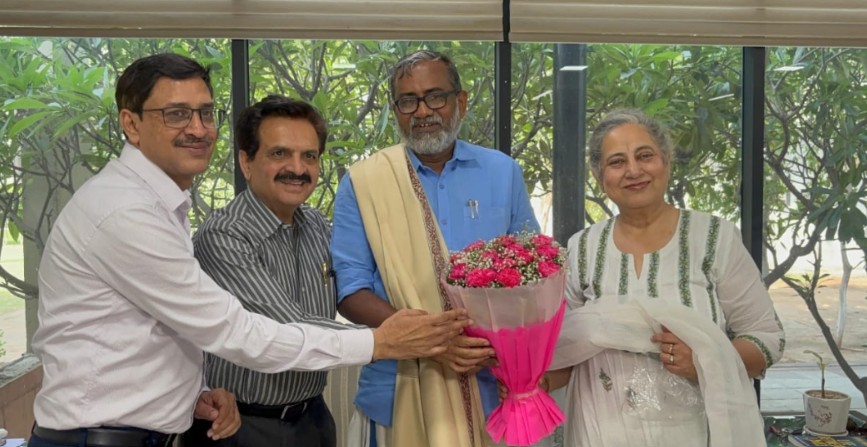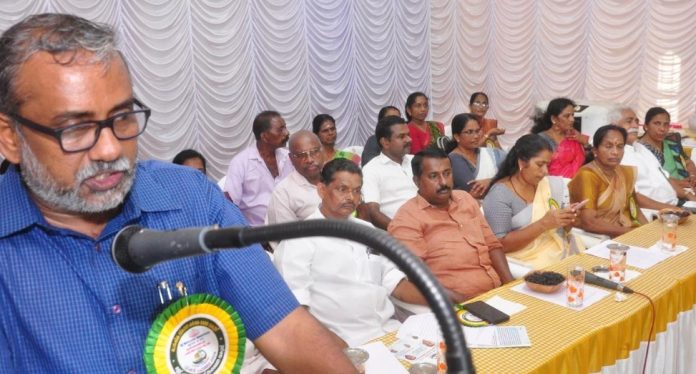Chandigarh, Punjab – In a significant demonstration of inter-state collaboration and a shared commitment to strengthening the nation’s food security framework, a high-level delegation led by the Kerala Food and Civil Supplies Minister, G.R. Anil, recently undertook a comprehensive visit to the Punjab State Food Commission Office in Chandigarh. This crucial engagement, a testament to the robust federal structure of India, provided a pivotal platform for an in-depth exchange of insights, best practices, and challenges pertaining to food grain procurement, public distribution systems, and the implementation of crucial nutritional security initiatives. The visit underscored the vital role of cross-state learning in addressing the complex and evolving dynamics of food access and affordability across diverse regional contexts.
The very premise of such a visit highlights the unique yet complementary roles Punjab and Kerala play in India’s intricate food ecosystem. Punjab, rightfully celebrated as the “food bowl of India,” has consistently been at the forefront of food grain production, primarily wheat and paddy, contributing a substantial portion to the national buffer stock. Its robust procurement system, managed by various state agencies in tandem with central bodies, ensures that farmers receive minimum support price (MSP) for their produce, thereby playing a critical role in agricultural sustenance. On the other hand, Kerala, a state with limited agricultural land and a high population density, is predominantly a consumer state, heavily reliant on food grain supplies from other states, including Punjab. Despite its dependence on external sources, Kerala is widely lauded for its exceptionally strong and efficient Public Distribution System (PDS), which is often cited as a model for ensuring food access and nutritional security for its populace.
Therefore, the visit by the Kerala Food and Civil Supplies Minister was deeply rooted in the pragmatic desire to learn from Punjab’s extensive experience in large-scale food grain procurement and its logistical management. The delegation sought to gain firsthand understanding of the mechanisms employed by Punjab to procure vast quantities of wheat and rice, manage storage, and effectively distribute these grains through its own PDS. Discussions delved into the operational efficiencies, technological integrations, and policy frameworks that underpin Punjab’s agricultural procurement machinery. This included detailed deliberations on the role of various state agencies, the challenges in ensuring timely payments to farmers, and the strategies for maintaining optimal storage conditions to prevent post-harvest losses.
At the Punjab State Food Commission Office, the visiting Minister, accompanied by senior officials from Kerala’s Food and Civil Supplies Department, engaged in extensive dialogue with the Chairman of the Punjab State Food Commission, D.P. Reddy, and other distinguished members of the commission. The Punjab State Food Commission, established under the National Food Security Act (NFSA), 2013, plays a pivotal role in monitoring and evaluating the implementation of the Act, ensuring that every entitled person receives their due share of food grains and nutritional support. The commission acts as a watchdog, addressing grievances, conducting social audits, and advising the state government on various aspects of food security policy. Its experience in grievance redressal, ensuring transparency, and tackling issues related to diversion or leakage in the PDS was a key area of interest for the Kerala delegation.

A significant portion of the discussions revolved around the challenges faced by both states. For Punjab, the concerns often centre on sustainable agricultural practices, managing surplus produce, crop diversification away from water-intensive paddy, and the economic well-being of its farmers amidst rising input costs. For Kerala, the primary challenges involve ensuring a consistent supply of food grains from other states, efficient logistics for transportation, and maintaining the integrity and reach of its PDS network to every household. The exchange allowed for a nuanced understanding of these distinct yet interconnected issues, highlighting how the strengths of one state could potentially inform solutions for the other. For instance, Punjab’s robust procurement model could offer insights into strengthening Kerala’s inter-state procurement strategies, while Kerala’s successful PDS reforms could provide valuable lessons for refining distribution mechanisms in Punjab.
The discussions also touched upon the broader aspects of nutritional security. Both states recognize that food security extends beyond mere caloric intake to include access to diverse and nutritious food. While Punjab contributes significantly to cereal production, efforts towards promoting crop diversification to include pulses, oilseeds, and vegetables are crucial for comprehensive nutritional security. Similarly, Kerala’s focus on supplementary nutrition programs, particularly for vulnerable groups like pregnant women, lactating mothers, and children, offered valuable insights into integrated welfare approaches. The idea of incorporating fortified foods within the PDS and promoting sustainable dietary habits also formed part of these enriching deliberations.
The significance of such inter-state cooperation cannot be overstated in India’s federal democratic setup. These ministerial visits foster a spirit of collaborative federalism, allowing states to learn directly from each other’s successes and failures without the need for central mediation. It enables the sharing of practical, on-the-ground experiences and innovative policy solutions that might not be readily apparent through top-down directives. Such dialogues also build stronger relationships between state administrations, facilitating smoother coordination on issues that transcend geographical boundaries, such as ensuring uninterrupted food grain supplies during emergencies or coordinating efforts to combat food adulteration and hoarding.
Furthermore, this visit underscores the overarching importance of food security as a national priority. Despite India’s significant progress in food grain production, ensuring equitable access, managing logistical complexities, and adapting to climate change impacts remain continuous challenges. By engaging in such dialogues, states are contributing to a more resilient and efficient national food security architecture. The lessons learned from Punjab’s procurement prowess and Kerala’s distribution efficiency can potentially inform policy refinements at both state and national levels, leading to a more robust and equitable system for all citizens.
In conclusion, the visit by the Kerala Food and Civil Supplies Minister to the Punjab State Food Commission Office, while a specific event in the broader timeline of inter-state relations, exemplifies a critical mechanism for shared learning and policy improvement. It highlights Punjab’s enduring role as India’s granary and its sophisticated agricultural procurement systems, offering invaluable lessons to consumer states like Kerala. Conversely, Kerala’s exemplary PDS model provides significant insights into effective food distribution and nutritional outreach. Such direct engagements between state leaders and experts are indispensable for fostering collaborative solutions to complex challenges. They strengthen the very fabric of India’s federal system, ensuring that best practices are replicated, and that the nation’s collective commitment to ensuring food and nutritional security for every citizen remains unwavering and dynamically adaptive to evolving needs.
Chandigarh, Punjab – In a significant display of inter-state collaboration and a shared commitment to strengthening India’s public welfare mechanisms, Kerala’s Agriculture Minister, P. Prasad, recently paid an official visit to the Punjab State Food Commission Office in Chandigarh. This high-level exchange, which took place on May 24, 2025, underscored the mutual desire of both states to learn from each other’s experiences in ensuring robust food and nutritional security for their citizens. The visit wasn’t merely a courtesy call; it initiated a crucial dialogue focused on identifying best practices and strategies, particularly concerning the effective implementation of the Mid-Day Meal Scheme, a vital component of nutritional well-being for millions of school children across the nation.
Punjab, often hailed as the “Food Bowl of India,” holds a unique position in the country’s food security narrative. Its fertile plains and advanced agricultural practices have consistently yielded bumper harvests, making it a pivotal contributor to the national food grain buffer stock. Consequently, the Punjab State Food Commission, currently chaired by Bal Mukand Sharma, plays a critical role in overseeing the robust Public Distribution System (PDS) and ensuring that the benefits of food security schemes reach every eligible household. The Commission is tasked with monitoring the implementation of the National Food Security Act (NFSA), 2013, investigating violations of food entitlements, and recommending measures for effective delivery of food and nutritional security. Its recent initiatives include empowering members with water sampling devices to assess drinking water quality in schools and Anganwadis, and moisture meters to evaluate food grain quality, reflecting a proactive approach to comprehensive nutritional security.
Kerala, on the other hand, presents a different yet equally compelling food security model. Despite being a food-deficit state in terms of its own agricultural production due to land constraints and a historical shift towards cash crops, Kerala boasts one of the most efficient and universal PDS systems in the country. It has historically ensured widespread access to subsidized food grains, contributing significantly to its impressive human development indicators. This visit by Minister P. Prasad was an opportunity for Kerala to gain insights into Punjab’s large-scale procurement and storage mechanisms, especially its meticulous handling of massive grain quantities, while Punjab could glean valuable lessons from Kerala’s effective distribution models and strategies for enhancing nutritional outcomes despite local production challenges.
The core of the discussion during Minister Prasad’s visit centered on ways to further enhance the Mid-Day Meal Scheme in both states. Punjab’s Chairman, Bal Mukand Sharma, provided comprehensive details about the scheme’s implementation in Punjab, which garnered significant commendation from the visiting Kerala Minister. Sharma elaborated on the state government’s foremost priority: promoting the cultivation of nutritious kitchen gardens and medicinal plants in schools across Punjab. This innovative approach aims to integrate fresh, locally grown produce into the Mid-Day Meal program, thereby improving the nutritional content and encouraging healthier eating habits among students. He also highlighted the Commission’s regular field visits to various districts to monitor the Mid-Day Meal Scheme, Anganwadis, and the broader food grain distribution systems, ensuring accountability and addressing ground-level issues promptly.
Minister P. Prasad, in turn, shared valuable insights into Kerala’s approach to the Mid-Day Meal Scheme. While the specific details of Kerala’s model were not extensively elaborated publicly, it is understood that Kerala has experimented with diverse strategies to ensure both the quantity and quality of meals, often leveraging local resources and community participation. The dialogue between the two states underscored the mutual recognition that while Punjab excels in food production and procurement, Kerala has carved a niche in efficient distribution and ensuring nutritional security through its robust social welfare programs. Such cross-learning is indispensable in a federal structure like India’s, where states can benchmark against each other’s successes and adapt policies to suit their unique contexts.
The significance of this inter-state cooperation cannot be overstated. In an era where food security and nutritional well-being are paramount national concerns, shared knowledge and collaborative initiatives between states can lead to more resilient and equitable systems. Punjab’s experience in managing massive agricultural surpluses and ensuring farmer remuneration through efficient procurement offers a valuable blueprint for other agrarian states, while Kerala’s expertise in universal food access and targeted nutritional interventions provides insights for consumer states. Such ministerial visits foster a spirit of cooperative federalism, breaking down silos between state administrations and creating platforms for exchanging best practices, innovative solutions, and addressing common challenges collectively.
Beyond the Mid-Day Meal Scheme, the discussions implicitly touched upon broader aspects of food security, including efficient food grain distribution, challenges in storage and transportation, and the crucial role of Anganwadis in early childhood nutrition. The emphasis on promoting kitchen gardens also highlighted a move towards localized food production and sustainable agricultural practices within the educational ecosystem, a step that can contribute to both food security and environmental sustainability. The exchange of mementos between Chairman Bal Mukand Sharma, Member Preeti Chawla, and Member Secretary Kamal Kumar Garg from the Punjab State Food Commission and Minister P. Prasad symbolized the positive rapport established during the visit, setting the stage for future collaborative endeavors.


